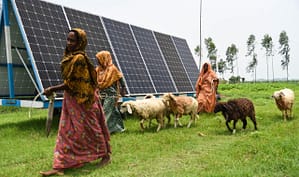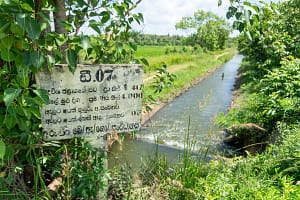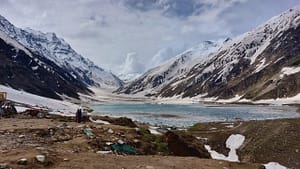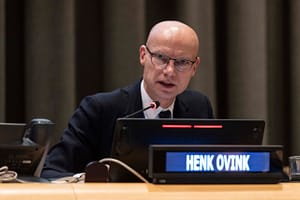Project Description / Background
This phase is a follow up project to the previous project on the Dams Dialogue in Ghana. In view of the fact that the Bui Dam is now under construction and that the impacts of dams are still being played out with issues around the Akosombo dam resettlement still remaining unresolved, there remains a need to pursue the dialogue through continued facilitation of the Ghana Dams Forum.
Some key concerns voiced by stakeholders during 2nd Forum meeting to climax the second phase of the dialogue process include having more transparency with regard to dam project development and implementation, more communication between the various stakeholder groups and more attention paid to conducting good research to inform the dialogue process.
With the primary aim to build capacities and provide tools for improved decision making on dams related issues which would lead to equitable, transparent, participatory and sustainable development of dams in Ghana, the GTZ has given a grant for the period of two years (1st January, 2009 to 31st December, 2010) to fund the current phase. The phase will be used to bring together representatives of all dam affected communities to share information and increase awareness about resettlement and dam related issues affecting local communities and capacity building; prepare a detailed research paper on the livelihood situation of affected communities and an institutional study to provide guidelines and recommendation towards a policy framework.
The National Coordinating Committee will be meeting regularly to steer the program by organizing two fora and two annual conferences to bring together representatives of all dam affected communities and other relevant stakeholders; and also have targeted meetings addressing sustainable dam development, with key players (key ministries and government agencies) who have a major stake in dams planning, construction management and operation.
Goal – Specific Objective
To build capacities and provide tools for improved decision making on dams related issues which would lead to equitable, transparent, participatory and sustainable development of dams in Ghana.
Objectives
- To provide recommendations and practical guidelines of primary use to the Bui Development Authority for managing impacts on dam affected communities (upstream and downstream of Bui), particularly those related to agricultural livelihoods and food security, through targeted studies.
- To share information and increase awareness about resettlement and dam related of issues affecting local communities and build capacity, amongst key stakeholders of the public, private and NGO sectors, at different levels from national to local, through roundtables and other learning mechanisms, and to bring on board very relevant stakeholders who hitherto have not been actively involved in the dialogue process
- To bring together representatives of all dam affected communities including Bui area and other relevant stakeholders to deliberate on problems of the townships to come up with a common agenda for action towards the redress of the negative impacts of dams on the affected communities.
- To understand decision and governance processes in Ghana related to the development and management of multi-purpose water resource projects and to evaluate the contributions of a multi-stakeholder dialogue towards influencing decisions.
Geographical Focus: Ghana
Project Representations/ Partners
The process has a secretariat, National Coordinating Committee and a sixty-member Forum. The Forum comprises representatives of Government Ministries, Decentralised Government Departments, Research Institutions, Opinion Leaders of Dam-affected Communities, Traditional Leaders, the Private Sectors and other stakeholders to discuss priority issues relating to dam construction and development in Ghana.
The Forum activities are coordinated by the National Coordinating Committee (NCC) comprising members from
- Volta River Authority
- Volta Basin Development Foundation
- Ministry of Energy
- Ministry of Water Resources, Works and Housing
- Water Resources Commission
- Water Research Institute
- Association of Ghana Industries
- Representative from the Proposed Bui Hydropower Area
- Representative from the Lower Volta Basin
- Volta Basin Research Project
- Ghana Journalists Association
- International Water Management Institute
- Lower Manya Krobo District Assembly
- National Association of the 52 VRA Resettlement Townships
- Bui Power Authority
Elements of the dialogue process
- The process started in 2006 with 6 institutional taskforce (Volta River Authority; Volta Basin Development Foundation; Ministry of Energy; Ministry of Water Resources, Works and Housing, Conservation International and Water Resources Commission)
- Task force transformed to Steering Committee (SC) submitted a proposal to GTZ and UNEP/DDP for the 1st phase of the process which ended up with a National Consultative Meeting in January, 2007.
- International Water Management Institute (IWMI) was approached to play advisory role to Steering Committee.
- During the 1st Phase, a consultant was identified to prepare Background Documentation for the process.
- The Document spelt out the composition of the Forum, National Coordinating Committee (NCC) and the Secretariat.
- The NCC met 3 times in the 2nd Phase before the 1st Forum in September 4, 2007
- After the 1st Forum, Consultants were identified to prepare issue papers on three issues namely:
# Strategies for Community Participation in Dam Development
# Issues on Compensation for Dam Affected Persons
# Research, Development and Capacity Building for the Sustainability of Dam Development with Special Reference to the Bui Dam Project. - The second full forum meeting of the Ghana Dams Forum was a two day meeting which took place on 26th and 27th February, 2008 at M Plaza Hotel, Accra, Ghana. About 150 stakeholders attended the workshop over the two day period, that was facilitated by an external facilitator. The main theme for the Forum was “Bringing Research Findings on Dams Closer to the People”. (See pictures from the Forum)
- The NCC ended the Second Phase of the Dialogue process with the 5th NCC meeting in March, 2008.
- In September 2008, the Secretariat started a process of submitting a proposal for the third phase.
- In December, GTZ accepted to support the third phase for a period of two years commencing January, 2009.
Donor
GTZ










